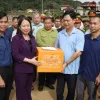National steering committee on semiconductor development set up
The steering committee, an inter-sectoral coordination organisation, is tasked with helping the Government and Prime Minister study, direct and coordinate with competent sides to handle important related issues.
Besides, it will be responsible for researching, giving consultations, recommendations and measures, as well as facilitating the coordination between relevant ministries and ministerial-level agencies, Government bodies, and related organisations to bolster the semiconductor industry development.
Prime Minister Pham Minh Chinh is the head of the committee, while deputy heads are the Minister of Planning and Investment, and the Minister of Information and Communications.
By 2045, Vietnam eyes to become an important link in the global semiconductor industry value chain with a contingent of engineers and experts capable of meeting the industry's requirements in both quality and quantity.
The country also plans to deeply engage in the semiconductor packaging and testing process, aiming to master part of the associated technology, as well as train 50,000 engineers to serve the industry across all stages of the value chain by 2030.
Nearly 160 out of about 240 universities across the nation are providing technology training, which would be expanded to semiconductors, and 35 educational institutions are offering majors related to semiconductors.
On May 3, the Vietnam National Innovation Centre (NIC) and Samsung Vietnam officially kick-started a technology talent development programme called ‘Samsung Innovation Campus (SIC)’ for the academic year 2023-2024 in Hanoi. It is the first joint effort between Samsung Vietnam and the NIC to realise the goal of training 50,000 semiconductor engineers by 2030.
Tags:





